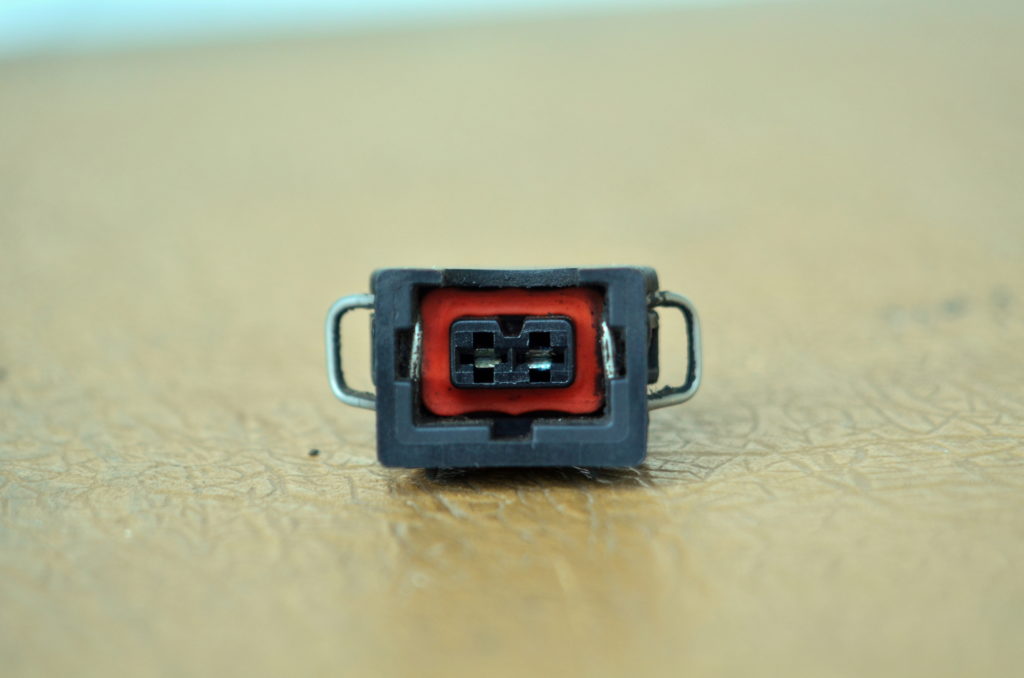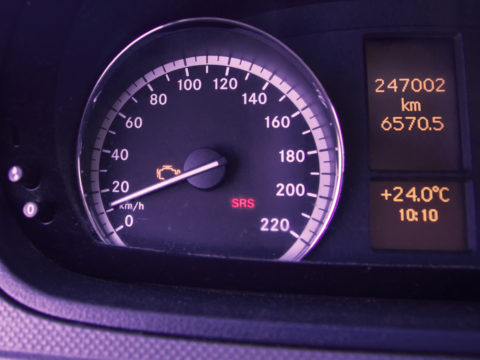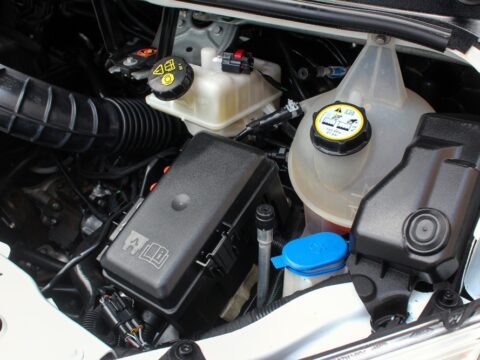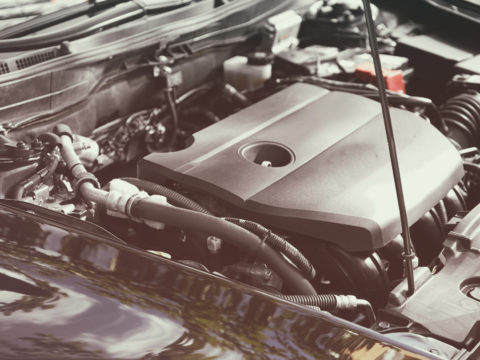Your car has a number of sensors to ensure there are no issues and it can run to full capacity. One of these is the knock sensor, and a bad knock sensor can cause severe damage to the engine if it is not addressed.

Knowing the symptoms of a bad knock sensor will give you the opportunity to take it to a mechanic to be checked before it causes too much damage.
Bad knock sensor symptoms include;
- An Illuminated Check Engine Light
- Knocking Engine
- Decreased Acceleration
- Engine Power Loss
- Inefficient Fuel Economy
Contents
What is a knock sensor in a car?
The knock sensor uses piezoelectric ceramics (a material that can convert movement, pressure, or vibrations into electrical signals) to pick up irregular vibrations. This information is then transmitted to the engine control unit or ECU, where it can determine whether it should alter the engine timing.
Knock sensor location
The knock sensor will typically be located on the outside of the engine block or beneath the intake manifold.
What does a knock sensor do?
The knock sensor is a vital part of your engine and is used to pick up on vibrations and sounds from the engine that suggest something is wrong with the engine.
The sensor can then pass this information to the engine control unit to manage the issue, potentially saving the car’s engine from severe damage.
What does a bad knock sensor sound like?
If you have a faulty knock sensor, you might hear sounds coming from your engine. This can sound like thumping that will gradually get louder as the air and fuel in the cylinder ignite rather than reaching the combustion point.
What are the symptoms of a bad knock sensor?
Knowing what symptoms to listen for and look out for can help you prevent damage to your engine and get the car checked out by a mechanic.
An Illuminated Check Engine Light
An illuminated check engine light should not be ignored. There are a number of problems that can cause it to light up, including a faulty knock sensor, and getting the issue diagnosed can help to prevent further damage from being caused.
Knocking Engine
Loud sounds coming from your engine are another tell-tale sign of a faulty sensor. The sounds will continue to get louder until the issue is resolved.
Decreased Acceleration
If your knock sensor fails, your engine will automatically reduce outputs to minimize the risk of engine damage and to ensure the car does not exceed emission levels.
Engine Power Loss
As well as impacting how quickly you will be able to accelerate, you will lose torque, and your top speed as the engine reduces its performance.
Inefficient Fuel Economy
As your engine reverts to default values, you will find the car no longer offers optimized performance. This poor engine performance will affect your fuel economy slightly.
What causes a knock sensor to go bad?
As well as knowing the symptoms of a failing knock sensor, understanding the causes can also be of great use to drivers. This will allow them to minimize the risk of damage. Here are the main causes of faulty sensors.
Contamination
A contaminated sensor can develop issues. Being located in a working engine means that they might come into contact with oil, antifreeze, or moisture, so trying to keep them clean can help to minimize the risk of a faulty sensor.
Cold Weather
Knock sensors are quite fragile, and extremes in temperature can cause damage to them. An overheating engine or freezing temperatures can cause them to expand and contract, leading to cracks.
Poor handling
Because knock sensors are so fragile, it is important they are handled with care. Dropping or fitting them too roughly can cause damage, leading to more significant faults down the line. Using tools to disconnect them can also damage the fragile parts.
Quality of Sensor
Buying high-quality parts for your vehicle might be more expensive at the time, but they can save you money in the long term because of their longevity, the performance they deliver, and the build quality.
Some cheaper knock sensors can be made with inferior parts and are more fragile than better quality examples.
Electrical Connection Failure
Poor internal wiring causing electrical connection failures is quite common with cheaper sensors. The only option available in this case would be to replace it.
How to test a knock sensor
Checking that your knock sensor is still working is important, and this can be done with a multimeter by following these steps.
- Step 1 – Ensure the vehicle is parked on a level surface with the parking brake engaged and the engine turned off.
- Step 2 – Locate the sensor by referring to the manufacturer’s repair manual.
- Step 3 – Carefully disconnect the knock sensor from the wire harness by pulling the base of the harness.
- Step 4 – When the sensor has been disconnected from the wire harness, clip the multimeter to a ground point on it. You are looking for continuity and a read that exceeds 10 ohms. Replace the sensor if there is no continuity.
Knock sensor replacement cost
Costs will vary for replacing a knock sensor depending on the make and model of your vehicle, the replacement sensor, and the mechanic carrying out the work.
On average, you could expect to pay anywhere between $20 and $200 for a sensor, and the labor costs can run anywhere from just $50 to $350, depending on how complicated the job is.
FAQs
How many knock sensors does a car have?
A car will typically have a number of sensors to maintain the engine’s performance. Cars will usually be equipped with one knock sensor per bank, meaning inline 4, 5, and 6 cylinder engines will have one, and V6, V8, and V10 engines will have two.
Can a knock sensor cause transmission problems?
If you have a faulty knock sensor, it will not relay the correct information to your engine control unit, so it will not know when to fire the spark plugs. This will cause power loss meaning the transmission will use different gear to compensate.
How long can I drive with a bad knock sensor?
You will be able to drive if your sensor is faulty, but it is not recommended. The length of time you drive with this fault will determine how much damage is then caused to the engine as a knock-on effect.
Without an efficient sensor in place, your car will not be running to its full potential, and if a fault develops, it will worsen and become louder as time passes.
If your engine warning light comes on, you should always get it checked. The average car has between 60 and 100 sensors, and they are all there for a good reason. Taking your vehicle to a mechanic if any sensor starts to fail can help you to minimize the damage your car might suffer from and reduce the cost of fixing it.
Can a bad knock sensor damage the engine?
A bad knock sensor can cause many problems, including damage to the catalyst, causing higher hydrocarbon emissions. Internal engine components can also become damaged, resulting in increased drag in your vehicle.














